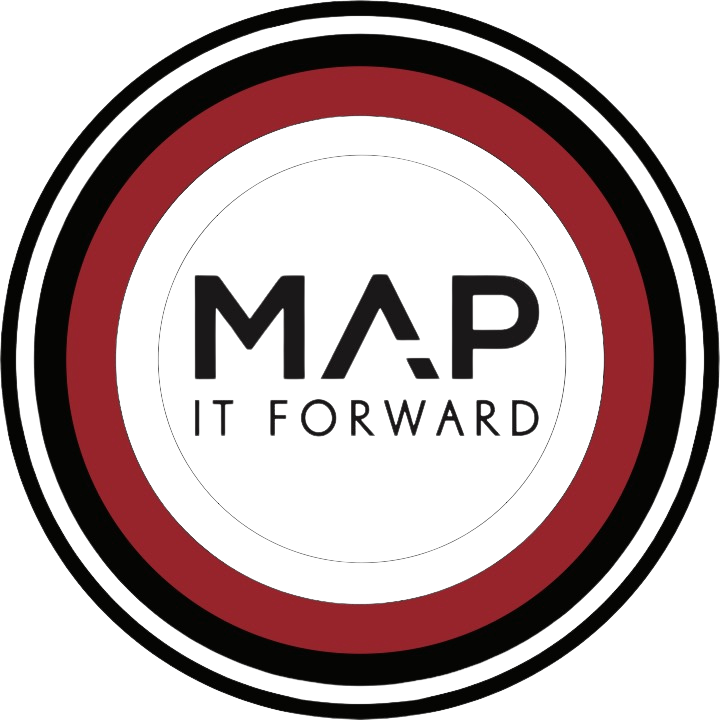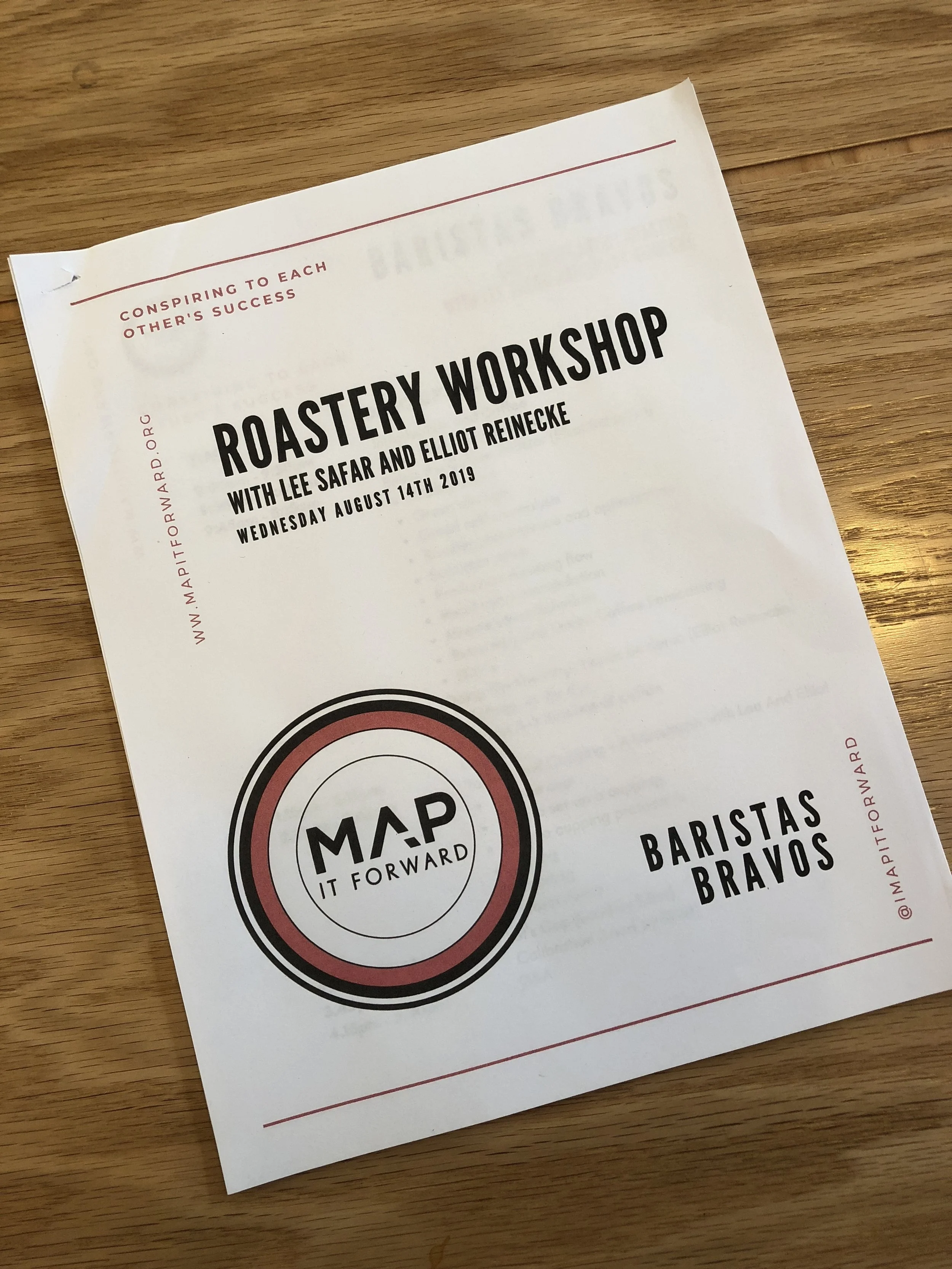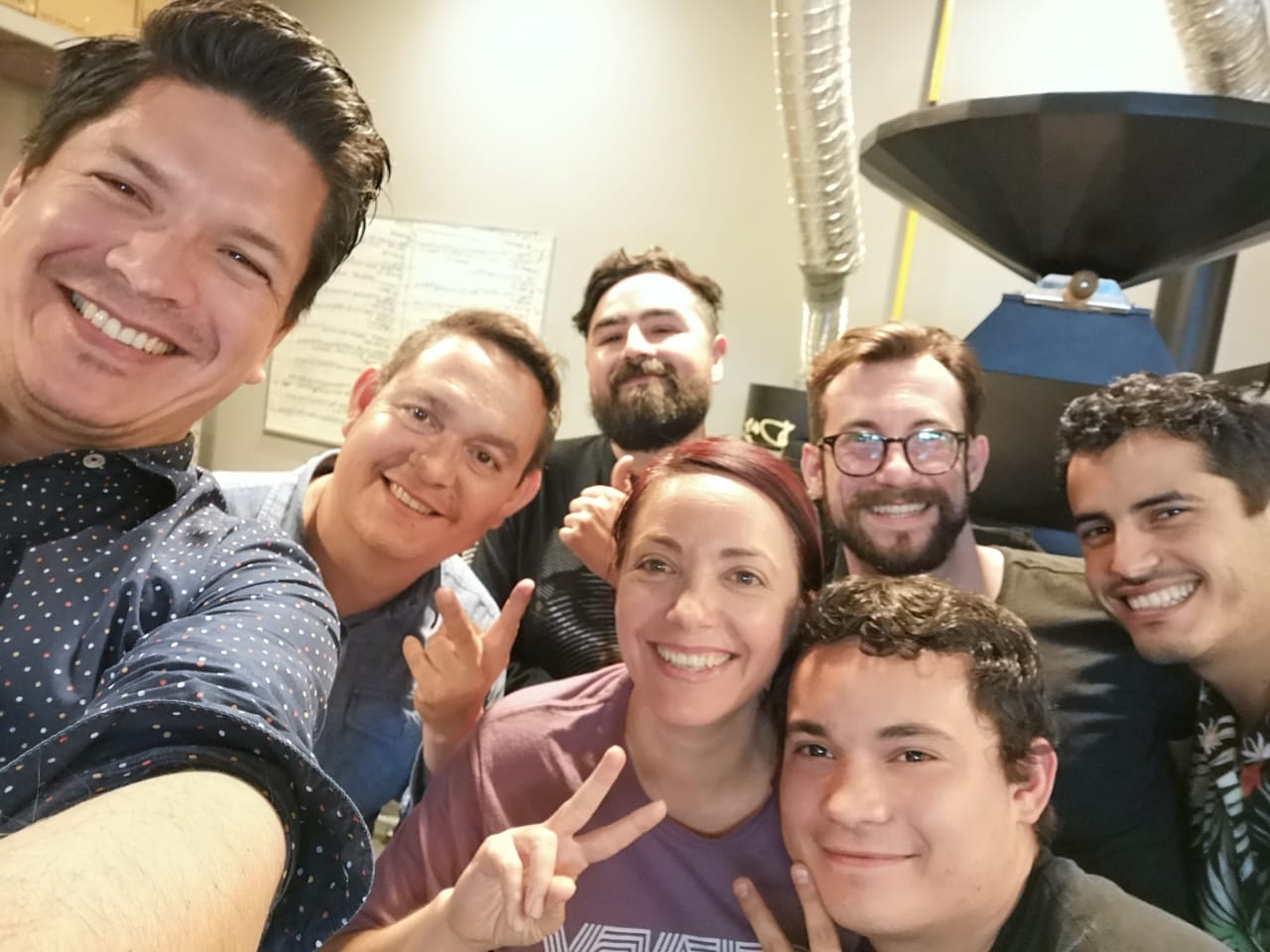Is It Time To Become a Coffee Consultant?
“How do I become a coffee consultant?”….
is a question most people in the coffee industry ask themselves at least once in their careers. An increasing number of coffee professionals and small business owners have been considering coffee consulting as an additional revenue stream or a career pivot since the pandemic started. This trend shows no signs of slowing down and truth be told, there's never been a better time to consider making the switch to a coffee consultant if you know how to plan for it.
Gaining independence from a day job while also having the chance to re-purpose the skills, knowledge, and experience you've accumulated over the years to help other people grow is an enticing alternative to "the grind" (no pun intended!) for so many coffee professionals.
Much like other careers in the coffee industry, coffee consultants have no defined career trajectories before or after they become a consultant. It's a "choose your own adventure" kind of deal. There is no standardized certification you're required to have to prove to your clients that you have sufficient industry, business, and professional acumen to foresee the potential blindspots they (your clients) are likely to encounter as their projects unfold.
This leads to someone's "barista friend" consulting on a menu creation project for a new cafe without any definitive understanding of how to do a cost breakdown analysis for each menu item. The items on the menu will taste great, and the roaster they've chosen may roast amazing (really expensive) high-end specialty coffee, but because their "barista friend" has no idea about profitability, the business will inevitably get a rude awakening when trading starts and they have high revenue but are still struggling to survive each month.
Alas, thanks to a perfect storm that's been brewing for the past few decades, times are changing! With the Great [Coffee] Resignation in our midst and a looming global financial collapse almost certainly on the horizon, there has never been a better time for coffee professionals with legitimate experience in their coffee niche (even our "barista friend" in the example above) to consider becoming a coffee consultant.
Contrary to what you may think, the role of the coffee consultant is fast evolving compared to the pre-pandemic era. The newfound opportunities this presents the hordes of people not returning to their coffee jobs is very exciting if you're prepared to put in the work.
The escalation of the opportunities that have come with the changes (and challenges) brought on by the pandemic are showing no signs of slowing down. We're witnessing the balance of power being redistributed across the value chain for the first time in a long time. Concurrently, we're seeing coffee consumer purchasing behavior continuing to trend towards home brewing despite everything "opening up".
Further, predicting all the ways technology will reshape the future of our industry is like the Avengers taking on Thanos in 3D Chess and being certain they have any idea how things are going to turn out. Consider how Bitcoin becoming mandatory legal tender in producing countries with change the way we trade, also how apps and online ordering will dominate the way offer hospitality, and how brewing automation is going revolutionize the role of the barista in the modern cafe. With great shifting in an industry comes great opportunity and right now the opportunities are endless if you know how to fix problems.
Below are 6 key points to consider if you're asking the question "Should I become a coffee consultant?". These points are derived from our "Become a Paid Coffee Consultant" program where we focus on making sure you build a consultancy business that can thrive, even if you're someone's "barista friend"!
1. Know Your Niche:
The term "coffee consultant" is ambiguous. Traditionally, coffee consultants would provide consultation services to coffee roasters or cafes on a variety of the usual things depending on their specialty - e.g. how to roast coffee, cafe setup, menus, barista training, etc.
Today, that's out the window. Green buyers who used to be full-time employees have decided to go out on their own and are offering their services to multiple small to medium size roasters, Baristas are consulting to the public by creating corporate remote team building events, and coffee roasters are consulting to producers and home roasters alike helping them to venture into the roasting space for the first time ever.
The largest mistake new consultants make is taking on a client they're not qualified to consult for despite having some of the experience (e.g. our "barista friend" and the cafe menu). Thinking you'll figure it out as you go is dangerous for your client's business and will almost certainly blow back on your ability to secure repeat customers. So for many reasons, please, don't do this!
Stick to building a great business from doing what you know. For example, our barista friend could make a great business consulting to the general public by teaching them how to brew coffee that's cafe-quality from their homes while also selling them curated coffee subscription boxes and brewing equipment. The ways you could do this are endless!
2. Know Your Product
Roastery Workshop: Day 1 of a 3 day MAP IT FORWARD Intensive tailor made consultation program for Baristas Bravos in Tijuana, Mexico in August 2019.
Every coffee consultant has their way of constructing their services. The different avenues for executing consulting services today are limitless based on who you are and what your clients need. Some consultants prefer one-on-one in person, some prefer one-on-one online. Some consultants prefer live group coaching/consulting while others prefer prerecorded coursework.
As a consultant, how your run your consulting services within the coffee niche you're occupying IS your product. It includes the amount of time you're offering your client, what access you're giving them to resources, any reports you'll deliver upon completion of the job, any introductions you're expected to make, and the goals or targets you've set out in your letter of engagement before you started your work relationship.
3. Know Your Customer
Knowing the detailed specifics of who your customers are and who they are not is integral to having a viable business. As a coffee small business consultant, this is something focus deeply on with all my one on one clients and group coaching clients alike.
If you're a coffee roasting consultant, defining your clients as simply "coffee roasters" will make your job launching your business far more difficult than it has to be. Instead, aim to create a variety (5 is recommended) of "customer personas" to describe who your intended clients would be. This outlines the specifics of who your customers are. An example to aim for is:
Sally - Dubai, UAE.
Anabella is in her 40's, is a home roaster, loves coffee, and has just left her job as a corporate astrophysicist to launch her small coffee roasting business. Anabella needs a consultant to help her buy her first commercial roasting machine, set up her roasting space, and buy green coffee. Her consultant will need to be local to Dubai so that she can learn to cup with them. Because Sally will be offering specialty grade arabica and robusta single-origins and blends that will be dark roasted, she needs a consultant with experience roasting and sourcing these coffees. Sally has a separate small business coffee consultant helping her to set up the business.
A customer persona person like this tells you important information about who your client is and how you can specifically help them. You should create 5 personas, figure out what they have in common and what's unique about each one. Once you've completed this step, creating a sales funnel (more on that later) will be much easier.
4. Know Your Pricing Model
Charging by the hour is the traditional way consultants have usually charged for their services. Today, anything that works goes, so you should get creative. Here are some options:
Monthly consulting rate: This is an agreed rate paid at the beginning of each month in return for the amount of time you commit to help the client with their business. If a client wants ongoing coaching/consulting beyond just a single hour here or there, this could be a great option. Be careful to have clearly stated boundaries so you both know the terms of your arrangement.
Group coaching: Learning as a group is a great way for people to get affordable consulting while also learning from other people's experiences. The bonus is that participants are supported by everyone in the group as well as the coach/consultant.
Consult to a community: Platforms like Patreon are wonderful for consultants who want to create content that communities find valuable. As a specialist on a topic, you release content that teaches people (in the industry or the general public) things they want to get better at. They then compensate you by paying a monthly fee. You'll cultivate an engaged community that will happily tell you what kind of content they want in the future.
There are many other ways to structure your pricing models but no matter what you choose, make sure you send a Letter of Engagement clearly stating both parties' expectations, including the agreed pricing structure, and what happens if any party fails to deliver.
5. Create a Customer Acquisition Plan (CAP)
Using all the information defined previously, your niche, your product, your customer, and your pricing model, you have all the elements required to create a Customer Acquisition Plan (CAP).
A CAP includes marketing and sales funnels that clearly show you how to find, communicate, engage with, and pitch to each of your defined customer personas.
If there's one secret weapon I wish more coffee small business owners, including coffee consultants, would take the time to create, it's a Customer Acquisition Plan. It has been a game-changer for all my clients and exponentially increases your chance of business success.
6. Landing Your First Client
A big part of being a consultant is managing people's expectations. This blog post is a form of free consulting so I want to take a second to manage your expectations about a few things all coffee consultants should know:
Solve problems: Unfortunately, most consultants try to trick people into engaging in their services in the beginning just to land their first client. Instead, ask yourself, "What problems out there in the market can I solve?" and then build a CAP to find the clients with those problems.
2%: If you build a great CAP, this is the conversion rate of people you should expect to convert into clients, compared to the number of people you pitch to. This means for every 100 people you pitch your services to (whether in person or via advertising), you can expect to land 2 clients. This is why well-constructed customer personas are so important. The more you know about your customers, the higher the quality of leads you'll be able to generate. The better the quality of leads, the more likely they are to want to choose you to solve their problems.
Don't quit your day job yet: until you build a customer base, consulting work should be an additional revenue stream rather than your main gig. This is true if you're consulting inside of the industry or to the general coffee-consuming public through Youtube, Patreon, or other social media platforms. I have seen too many people's dreams crushed because so-called social media influencers fail to mention the enormous time and effort required to get their consulting businesses off the ground. If you have a great CAP and are willing to play the long game while working hard, you'll turn that extra revenue stream into a business that sustains a great lifestyle for you.
Get help getting started: I'd call what I'm about to say a shameless plug if I hadn't seen the profound difference our coffee consultant workshops have made towards people's endeavors to get started. If you want guidance in learning how to work through the 6 points outlined above, consider registering for our program "Become a Coffee Consultant". Our success rate with this program has been so good that we have never had to return any money despite our 100% money-back guarantee.
Don't consult for free: New coffee consultants are often roped into doing free consulting hoping that it will lead to future paid work. If you're not getting paid you're not accountable for the outcome. Accountability is important for ensuring quality work. Give a potential client 30 mins of your time to hear what their problems are and determine if you can help to solve the problems. Demonstrate a little (but not all) of the solutions you can bring to the table. For example, "Sally, I can introduce you to Person A and B from Company X and Y here in Dubai that import some of the best specialty coffee green Arabica and Robusta available to this part of the world. As you grow, I can connect you with my contacts overseas.". This should be enough to demonstrate you have the contacts Sally is looking for.
Money-Back Guarantee: If you're worth your services, back them with a 100% money-back guarantee. Be sure to check in with your client at the end of every meeting to be sure they're more than satisfied with your service. If there's a problem, fix it. If they're happy, confirm this by asking the question "Are you satisfied with my services so far? Are you happy to continue with our working relationship?"
There has never been a better time to consider becoming a coffee consultant. The pool of potential clients has been flung wide open thanks to the pandemic and technology. This has, in turn, opened up opportunities for coffee professionals who were previously limited from becoming coffee consultants because of their limited time in the industry.
I tell all of my business consulting clients "Business is going to teach you everything you never wanted to know about yourself". If you're prepared to become a coffee consultant knowing this important fact, I encourage you to go for it! It's a very fulfilling career!
Handout from day 3 of a 3 day MAP IT FORWARD tailored intensive consultation program for Baristas Bravos in Tijuana, Mexico. Photo by @jimbo250693
Happy team after the final day of the MAP IT FORWARD tailored intensive consultation program for Baristas Bravos in Tijuana, Mexico. Could be more proud of these coffee professionals at and what they have coming @baristasbravos
The Baristas Bravos team learning how to cup on Day 1 of a 3 day MAP IT FORWARD Intensive tailor made consultation program Tijuana, Mexico in August 2019.
This article was written by Lee Safar @leesafar - Founder of MAP IT FORWARD and Elixir Specialty Coffee, Coffee Small Business Coach/Consultant, and host of The MAP IT FORWARD Podcast. If you’d like more information on joining the MIF mastermind coaching groups Click here for more details. For one on one consulting, contact us here.





